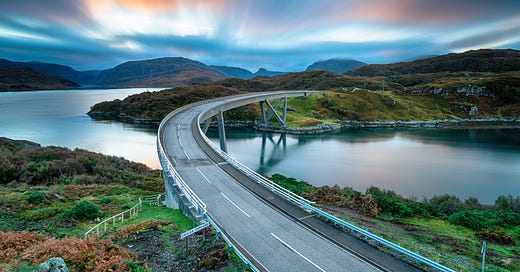Is it ever OK to make a loss?
Richard Franks on loss-making projects that bring plenty of other benefits
We are taking a well-deserved break for June, so instead of fresh content we’re sending out re-runs of some of our most-read and most-engaged with newsletters from the past twelve months, free for all to read. Paid subscribers — don’t worry, we’ll add a month onto all your subscriptions so you don’t lose out on shiny, fresh content from July onwards. Free subscribers, if you like what you see, please consider becoming a paid supporter of this newsletter.
It’s an incredible feeling to be deemed authoritative enough to work on an *actual* physical guidebook. As a Scotland specialist, when I was approached to update a popular guide to the North Coast 500 I was more than happy to oblige.
Those who follow me on social media will see I spend most of my time away from home and instead in Scotland, so the chance to get back on Britain’s best road trip was something I wasn’t going to turn down. But for those who don’t know the ins and outs of guidebooks, it can be one of the most thankless tasks you could possibly agree to do in your travel writing career.
That’s not because it’s unenjoyable. Far from it — I’ve just spent two and a bit weeks on a research trip in my favourite part of the world, and I’m going back up again later this week to fill in the gaps. I’m referring more to the finances involved in guidebook updates, or lack of, versus time spent working.
Before signing the contract for this commission, I knew I would undoubtedly lose money. So why on earth did I take on the job?
And is it ever ok to make a loss?
This North Coast 500 guidebook is a small one at just 88 pages, and an update isn’t a full rewrite. It’s largely fact-checking, making sure places are still open/up to scratch, and replacing listings if they’re not…which is a challenge itself after a pandemic.
We’re offering a 25% birthday discount — 5% for every year of TTW — which is running until the end of the month. Purchase a monthly subscription for just £5.25 or an annual subscription for £45 and you’ll receive four emails each month, all packed with expert insights.
I accepted this job because I specialise in Scotland, so to be seen working on a guidebook will put me in good stead for future opportunities. I wouldn’t accept a guidebook offer on a country I knew little about as it would just take too long.
Incomings and outgoings
Although I’d be spending a few weeks making notes on the road, I estimated the actual update itself would take no more than three days of desk work.
My fee for this guidebook update is £352. That’s a desk-bound day rate of around £117. If you take into account those days on the road, it’s a general day rate closer to £15. Yikes.
Owing to my freelance status and subsequent lack of expenses covered, the largest outlay on trips like these is always the travel, as you can see from my recent trip:
Outgoings
Petrol - £239.08
Food & Drink - £62.26
Miscellaneous (mostly parking) - £14.50
Subtotal = £315.84
It’s therefore crucial on a guidebook research trip to be frugal with your finances. I had all 15 nights of my trip fully comped, with all but two hotel nights including breakfast and dinner. I mostly made my own lunches too.
I’ll be back up for five nights across Inverness and Ullapool later this week with comped accommodation and car hire, so I’ll now also add £55 for a media rate flight to Inverness. Add petrol, food/drink and miscellaneous spends probably totalling around £80, and the outgoings suddenly shoot up to at least £450.84.
I’m now losing money on this job.
How can this type of work be financially beneficial?
Nobody becomes a travel writer to get rich, but this is my full-time job and I must be sensible with my business finances. For this job to benefit my bank balance I need to pack as much in as possible.
Having pitched ideas based on areas I’d be passing around the North Coast 500, I managed to book-end either side of my trip with visits to Skye and the Cairngorms, and lined up other related commissions:
Isle of Skye: One guidebook chapter for Lonely Planet and a hotel review for Telegraph, totalling £475
Cairngorms: A bumper 3,000-word Telegraph Travel print feature totalling £1,015
NC500: A guide to the North Coast 500 for weather2travel and this newsletter piece, totalling £300
That comes to a guaranteed £1,790. Since returning, I also have leads for other NC500 stories totalling £800, which could take me up to £2,590. Subtract the ~£98.84 loss from earlier and that’s a much healthier £2,491.16 for around three weeks on the road.
Without taking on the guidebook, I probably wouldn’t have bagged any of the above commissions, which just goes to show: it’s not always about the fee, it’s about how to make it work for you.
This was the third in our birthday month series, where we’re republishing our most-read articles for free. Want more money tips to get your teeth into? Check out Meera Dattani’s webinar series on travel writing here — new webinars are coming in June, too, so keep an eye out here for announcements. Our online course has tonnes of tips on this topic; head to our Teachable shop here.







I couldn't agree more. There are definitely situations where you can turn a loss into a gain and it doesn't always have to be financial either. Great article!
100%. Great way to turn a potential loss into a profitable investment. Thanks for sharing!